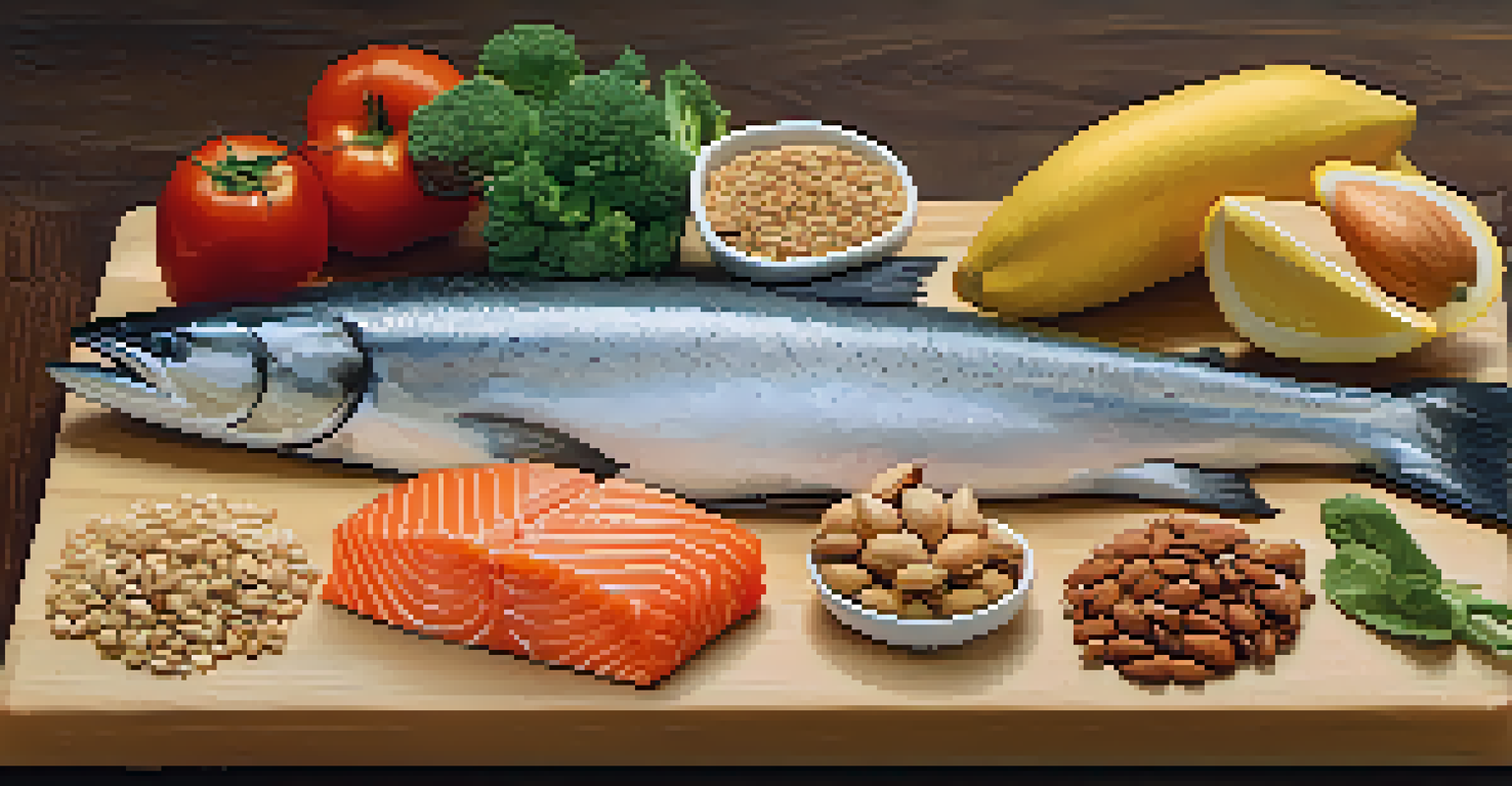Role of Nutrition in Preventing Cardiovascular Diseases

What is Cardiovascular Disease and Its Impact?
Cardiovascular disease (CVD) refers to a range of heart and blood vessel disorders, including heart attacks and strokes. It’s a leading cause of death globally, affecting millions of people each year. Understanding CVD helps us appreciate the importance of prevention strategies, particularly through nutrition.
The greatest wealth is health.
The impact of CVD is profound, not only on individual health but also on public health systems. Treating these diseases often involves long-term care and management, which can strain resources. This makes prevention through lifestyle choices, especially diet, vital to reducing the burden of heart diseases.
By focusing on what we eat, we can significantly lower the risk factors associated with CVD. This includes addressing issues like high cholesterol, hypertension, and obesity, all of which can be influenced by our dietary choices.
Key Nutrients for Heart Health
Certain nutrients play a crucial role in maintaining heart health. Omega-3 fatty acids, found in fish like salmon, can help reduce inflammation and lower blood pressure. Antioxidants, abundant in fruits and vegetables, also combat oxidative stress, which is linked to heart disease.

Fiber is another essential nutrient that aids in lowering cholesterol levels. Whole grains, legumes, and nuts are excellent sources. By incorporating these foods into our diet, we can create a heart-healthy eating plan that supports overall well-being.
Understanding Cardiovascular Disease
Cardiovascular disease is a leading global health issue that highlights the need for effective prevention strategies, particularly through nutrition.
Additionally, vitamins like B6, B12, and folate contribute to heart health by helping to regulate homocysteine levels in the blood, potentially reducing the risk of heart disease. This highlights the importance of a diverse diet rich in various nutrients.
The Role of Healthy Fats in Your Diet
Healthy fats, such as those found in avocados, nuts, and olive oil, are essential for maintaining heart health. Unlike trans fats and saturated fats, which can raise cholesterol levels, healthy fats can actually improve your lipid profile. This means a lower risk of developing CVD.
Let food be thy medicine and medicine be thy food.
Incorporating these healthy fats into your meals can be as simple as swapping butter for olive oil or snacking on nuts instead of chips. These small changes can have a significant impact on your heart health over time.
It's important to remember that moderation is key. While healthy fats are beneficial, they are still calorie-dense, so keeping an eye on portion sizes is crucial for managing overall calorie intake.
The Importance of Fruits and Vegetables
Fruits and vegetables are powerhouses of nutrition, packed with vitamins, minerals, and antioxidants. They are low in calories and high in fiber, making them ideal for maintaining a healthy weight and reducing the risk of heart disease. Aim for a colorful variety on your plate to maximize nutrient intake.
Research shows that consuming a diet rich in fruits and vegetables can lower blood pressure and cholesterol levels, both of which are risk factors for CVD. For instance, leafy greens like spinach and kale contain potassium, which helps regulate blood pressure.
Key Nutrients for Heart Health
Incorporating essential nutrients like omega-3 fatty acids, fiber, and antioxidants into your diet can significantly lower the risk of heart disease.
Incorporating fruits and vegetables into every meal can be a tasty and satisfying way to protect your heart. Smoothies, salads, and stir-fries are just a few delicious options that can make it easy to reach your daily servings.
Limit Processed Foods and Added Sugars
Processed foods often contain high levels of unhealthy fats, sodium, and added sugars, all of which can contribute to heart disease. These ingredients can lead to weight gain, increased blood pressure, and elevated cholesterol levels. Being mindful of food labels can help you make healthier choices.
Making a conscious effort to limit processed foods can be transformative for your heart health. Instead of reaching for packaged snacks, consider whole food alternatives like fruit, nuts, or yogurt. These options not only nourish your body but also support a healthier heart.
By reducing added sugars in your diet, you can also help control weight and prevent insulin resistance. This means saying goodbye to sugary drinks and desserts, and hello to natural sweeteners like fruit or honey in moderation.
Hydration's Role in Cardiovascular Health
Staying hydrated is often overlooked, yet it's vital for maintaining optimal cardiovascular health. Water aids in circulation and helps regulate blood pressure. Dehydration can strain the heart and lead to complications, especially for those already at risk for CVD.
Aim to drink plenty of water throughout the day, and remember that other beverages and foods can contribute to your hydration needs. Herbal teas, fruits, and vegetables can be excellent sources of fluid, making it easier to stay hydrated.
Creating a Heart-Healthy Plan
Developing a heart-healthy eating plan involves gradually replacing processed foods with whole foods while seeking support from others.
Moreover, reducing intake of sugary drinks not only helps with hydration but also aligns with a heart-healthy diet. This simple change can go a long way in supporting your overall health and well-being.
Creating a Heart-Healthy Eating Plan
Crafting a heart-healthy eating plan doesn’t have to be daunting. Start by assessing your current diet and identifying areas for improvement. Gradually introduce more whole foods, such as fruits, vegetables, whole grains, and lean proteins, while reducing processed options.
Meal planning can be a helpful strategy. By preparing meals in advance, you ensure that you have nutritious options readily available, making it easier to stick to your goals. Consider trying new recipes that incorporate heart-healthy ingredients to keep things exciting.

Lastly, don’t forget to seek support from friends or family. Sharing your journey towards better nutrition can provide motivation and encouragement, making it easier to adopt and maintain a heart-healthy lifestyle.